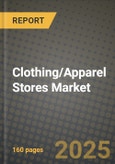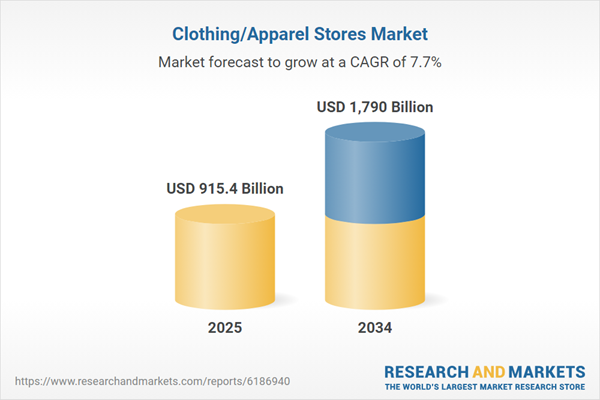The clothing/apparel stores market continues to thrive, driven by evolving consumer trends, rising disposable incomes, and the expanding influence of digital technology on shopping habits. Clothing retailers offer a wide range of products, including casual wear, formal wear, activewear, and outerwear, catering to diverse customer preferences and demographics. While brick-and-mortar stores remain essential for providing tangible experiences and immediate purchases, the shift to omnichannel retailing has enabled apparel brands to reach broader audiences, streamline operations, and enhance customer engagement. This dual approach of combining physical storefronts with robust online platforms has helped apparel stores maintain steady growth even amidst changing market dynamics.
A significant trend shaping the industry is the growing demand for sustainable and ethically produced apparel. More consumers are seeking out brands that prioritize environmental responsibility, ethical labor practices, and transparent supply chains. Another key trend is the integration of advanced technologies such as virtual fitting rooms, AI-driven personalized recommendations, and mobile payment solutions, all designed to improve the shopping experience. The rise of influencer marketing and social commerce - where consumers discover and purchase clothing directly through social media platforms - has further reshaped how clothing brands connect with their audiences and generate sales.
Despite its positive trajectory, the clothing/apparel stores market faces challenges such as supply chain disruptions, fluctuating raw material costs, and increasing competition from fast fashion players and online-only retailers. Adapting to these challenges while staying aligned with shifting consumer values and preferences will be critical for sustained growth. Retailers that embrace sustainability, digital innovation, and customer-centric strategies are likely to succeed in this dynamic and competitive marketplace.
Key Insights: Clothing/Apparel Stores Market
- Increased consumer demand for sustainable and ethically produced clothing.
- Adoption of advanced technologies, such as virtual fitting rooms and AI-driven product recommendations.
- Growth of social commerce and influencer marketing for apparel brands.
- Shift toward omnichannel retailing, blending in-store and online experiences.
- Expansion of customization options, allowing customers to personalize their purchases.
- Rising disposable incomes and shifting consumer lifestyles encouraging apparel spending.
- Global population growth and urbanization fueling demand for diverse clothing options.
- Growing influence of fashion trends and celebrity endorsements on purchasing decisions.
- Advancements in e-commerce platforms improving accessibility and convenience.
- Supply chain disruptions and raw material price fluctuations impacting costs and availability.
- Intense competition from established brands, fast fashion retailers, and online-only platforms.
- Meeting diverse consumer preferences and staying relevant in a rapidly changing market.
Clothing/Apparel Stores Market Segmentation
By Type
- Clothing/Apparel Stores
- Jewelry and Watch Stores
- Optical Goods Stores
- Footwear Stores
By Type of Store
- Exclusive Showroom
- Dealer Store
By Ownership
- Retail Chain
- Independent Retailer
By End-User
- Men
- Women
- Kids Or Infants
Key Companies Analysed
- Inditex (Zara, Bershka, Pull & Bear)
- H&M Group
- Fast Retailing Co., Ltd. (Uniqlo)
- Gap Inc.
- VF Corporation
- Abercrombie & Fitch Co.
- American Eagle Outfitters
- Urban Outfitters, Inc.
- Next plc
- Primark (Associated British Foods)
Clothing/Apparel Stores Market Analytics
The report employs rigorous tools, including Porter’s Five Forces, value chain mapping, and scenario-based modeling, to assess supply-demand dynamics. Cross-sector influences from parent, derived, and substitute markets are evaluated to identify risks and opportunities. Trade and pricing analytics provide an up-to-date view of international flows, including leading exporters, importers, and regional price trends.Macroeconomic indicators, policy frameworks such as carbon pricing and energy security strategies, and evolving consumer behavior are considered in forecasting scenarios. Recent deal flows, partnerships, and technology innovations are incorporated to assess their impact on future market performance.
Clothing/Apparel Stores Market Competitive Intelligence
The competitive landscape is mapped through proprietary frameworks, profiling leading companies with details on business models, product portfolios, financial performance, and strategic initiatives. Key developments such as mergers & acquisitions, technology collaborations, investment inflows, and regional expansions are analyzed for their competitive impact. The report also identifies emerging players and innovative startups contributing to market disruption.Regional insights highlight the most promising investment destinations, regulatory landscapes, and evolving partnerships across energy and industrial corridors.
Countries Covered
- North America - Clothing/Apparel Stores market data and outlook to 2034
- United States
- Canada
- Mexico
- Europe - Clothing/Apparel Stores market data and outlook to 2034
- Germany
- United Kingdom
- France
- Italy
- Spain
- BeNeLux
- Russia
- Sweden
- Asia-Pacific - Clothing/Apparel Stores market data and outlook to 2034
- China
- Japan
- India
- South Korea
- Australia
- Indonesia
- Malaysia
- Vietnam
- Middle East and Africa - Clothing/Apparel Stores market data and outlook to 2034
- Saudi Arabia
- South Africa
- Iran
- UAE
- Egypt
- South and Central America - Clothing/Apparel Stores market data and outlook to 2034
- Brazil
- Argentina
- Chile
- Peru
Research Methodology
This study combines primary inputs from industry experts across the Clothing/Apparel Stores value chain with secondary data from associations, government publications, trade databases, and company disclosures. Proprietary modeling techniques, including data triangulation, statistical correlation, and scenario planning, are applied to deliver reliable market sizing and forecasting.Key Questions Addressed
- What is the current and forecast market size of the Clothing/Apparel Stores industry at global, regional, and country levels?
- Which types, applications, and technologies present the highest growth potential?
- How are supply chains adapting to geopolitical and economic shocks?
- What role do policy frameworks, trade flows, and sustainability targets play in shaping demand?
- Who are the leading players, and how are their strategies evolving in the face of global uncertainty?
- Which regional “hotspots” and customer segments will outpace the market, and what go-to-market and partnership models best support entry and expansion?
- Where are the most investable opportunities - across technology roadmaps, sustainability-linked innovation, and M&A - and what is the best segment to invest over the next 3-5 years?
Your Key Takeaways from the Clothing/Apparel Stores Market Report
- Global Clothing/Apparel Stores market size and growth projections (CAGR), 2024-2034
- Impact of Russia-Ukraine, Israel-Palestine, and Hamas conflicts on Clothing/Apparel Stores trade, costs, and supply chains
- Clothing/Apparel Stores market size, share, and outlook across 5 regions and 27 countries, 2023-2034
- Clothing/Apparel Stores market size, CAGR, and market share of key products, applications, and end-user verticals, 2023-2034
- Short- and long-term Clothing/Apparel Stores market trends, drivers, restraints, and opportunities
- Porter’s Five Forces analysis, technological developments, and Clothing/Apparel Stores supply chain analysis
- Clothing/Apparel Stores trade analysis, Clothing/Apparel Stores market price analysis, and Clothing/Apparel Stores supply/demand dynamics
- Profiles of 5 leading companies - overview, key strategies, financials, and products
- Latest Clothing/Apparel Stores market news and developments
Additional Support
With the purchase of this report, you will receive:- An updated PDF report and an MS Excel data workbook containing all market tables and figures for easy analysis.
- 7-day post-sale analyst support for clarifications and in-scope supplementary data, ensuring the deliverable aligns precisely with your requirements.
- Complimentary report update to incorporate the latest available data and the impact of recent market developments.
This product will be delivered within 1-3 business days.
Table of Contents
Companies Mentioned
- Inditex (Zara Bershka
- Pull & Bear)
- H&M Group
- Fast Retailing Co.
- Ltd. (Uniqlo)
- Gap Inc.
- VF Corporation
- Abercrombie & Fitch Co.
- American Eagle Outfitters
- Urban Outfitters Inc.
- Next PLC
- Primark (Associated British Foods)
Table Information
| Report Attribute | Details |
|---|---|
| No. of Pages | 160 |
| Published | October 2025 |
| Forecast Period | 2025 - 2034 |
| Estimated Market Value ( USD | $ 915.4 Billion |
| Forecasted Market Value ( USD | $ 1790 Billion |
| Compound Annual Growth Rate | 7.7% |
| Regions Covered | Global |
| No. of Companies Mentioned | 12 |









